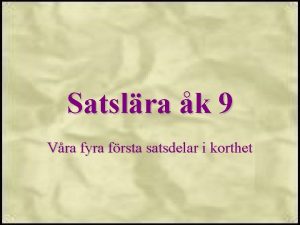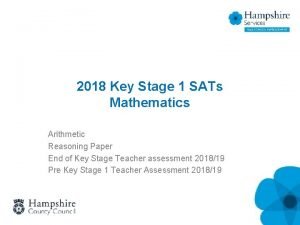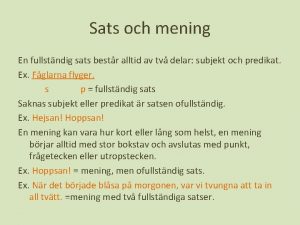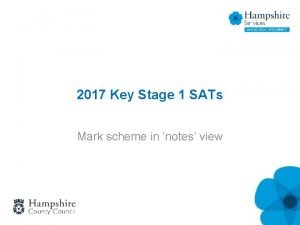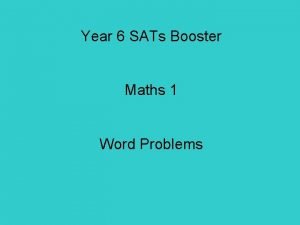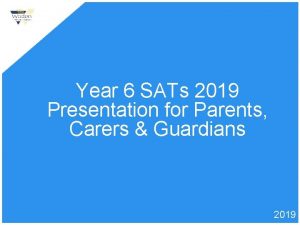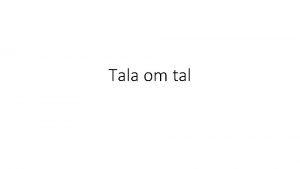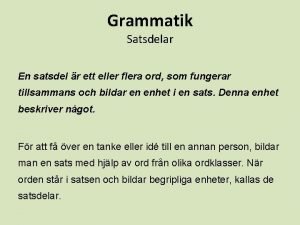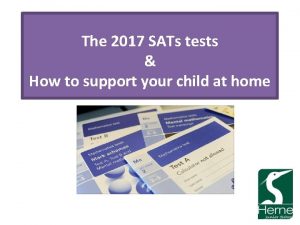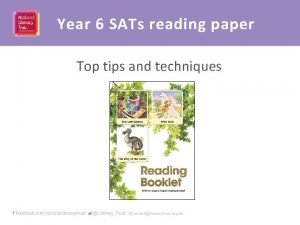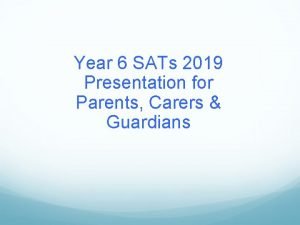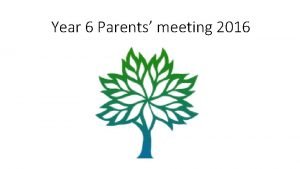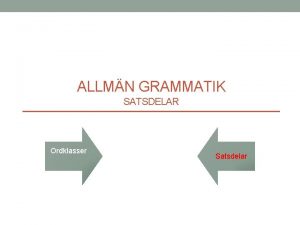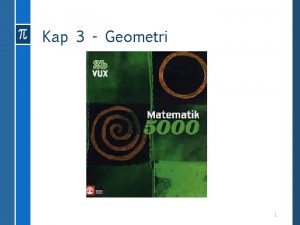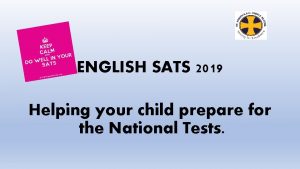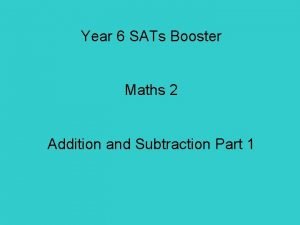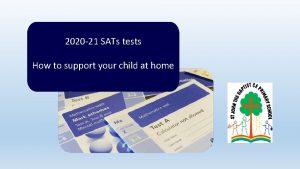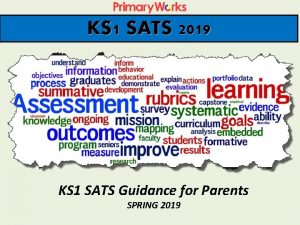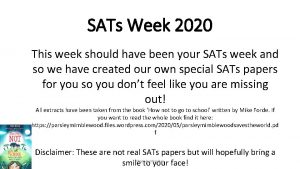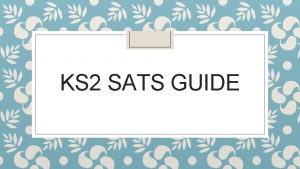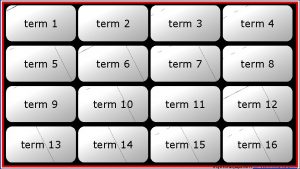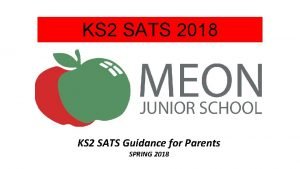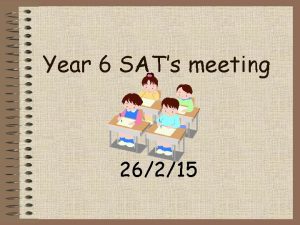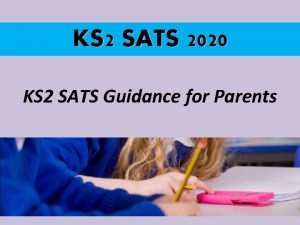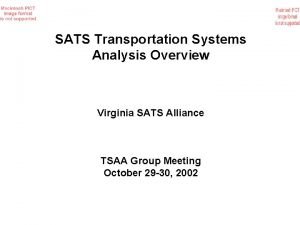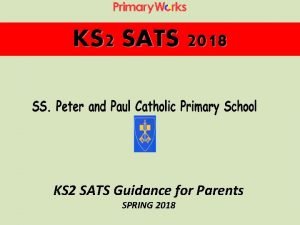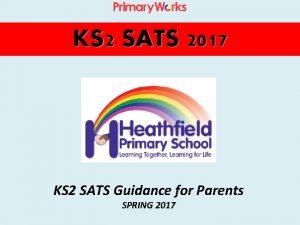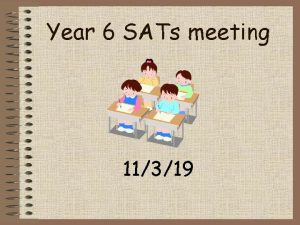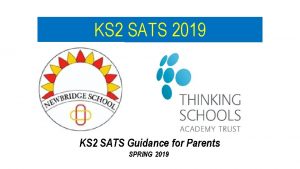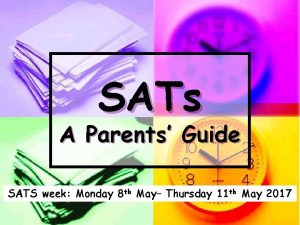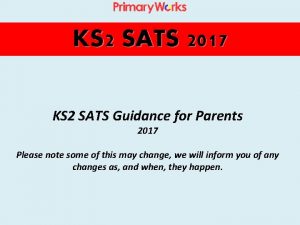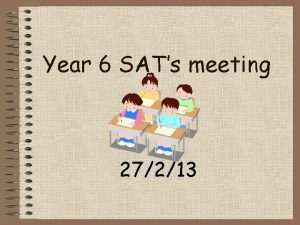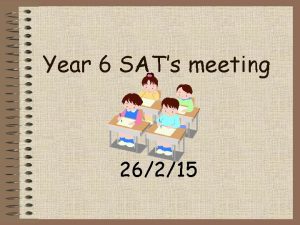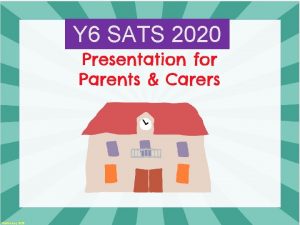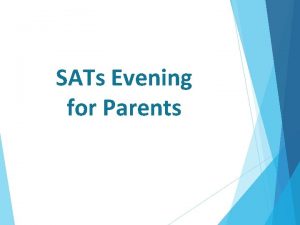What are SATs SATs is a term people





















- Slides: 21


What are SATs? • SATs is a term people use to refer to End of Key Stage 2 Assessments; • They last for four days beginning on: Monday 11 th May 2020 -Thursday 14 th May 2020.

Monday 11 th May Spelling, Punctuation and Grammar Paper 1 out of 50 marks 45 minutes Tuesday 12 th May Reading Paper out of 50 marks 60 minutes Wednesday 13 th May Thursday 14 th May Maths Arithmetic Paper 1 Out of 40 marks 30 minutes Maths Reasoning B Paper 3 Out of 35 marks 40 minutes Maths Reasoning A Paper 2 Out of 35 marks 40 minutes Total score: 110 Marks Total score: 50 Marks Spelling, Punctuation and Grammar Paper 2 out of 20 marks 30 mins Total score : 70 Marks • Writing is assessed using evidence collected by your child’s teacher throughout Year 6, so there is no Year 6 SATs writing test.

How are the SATs carried out? • The tests will take place during normal school hours, under exam conditions; • Children are not allowed to talk to each other from the moment the assessments are handed out until they are collected after the test has ended; • Afterwards, the completed papers are sent away to be marked externally; • The children’s results are sent back to school at some point in July;

What do the results look like? Once marked, the tests will be given the following scores: o A raw score (the total number of marks achieved for each paper); o A scaled score (which is explained below); o A judgement of whether the National Standard has been met. After marking each test, the external markers will convert each raw score into a scaled score to show whether each child is working below, at or above the national standard. When the scaled score is given, it is given in a range from 80 to 120.

Spelling, Punctuation and Grammar Paper 1

Spelling, Punctuation and Grammar Paper 2

Reading Paper The children are required to read three separate texts and answer questions on each text. The Year 6 Reading SATs paper requires a range of answering styles, including responding to multiple choice questions, one-word answers, and multiple mark questions which require more formal paragraph-length answers.

Maths Paper 1: Arithmetic It covers the four operations (division, multiplication, addition, subtraction and mixed operation calculations requiring BIDMAS), as well as number properties, calculating percentages of amounts, calculations using decimals, and calculations using fractions. Example questions:

Short Multiplication Long Multiplication

Short Division Long Division

Maths Paper 2 & 3: Reasoning Paper 2 requires children to demonstrate their mathematical knowledge and skills, as well as their ability to solve problems with mathematical reasoning.

How can you help your child get ready for SATs? Firstly, a positive attitude goes a long way – so as much encouragement and support as possible (but we don’t need to tell you that)! Some further tips: • Encourage your child to complete their homework on time. • Encourage your child to talk to their teacher or another adult they trust if they express persisting anxieties about SATs. Remember that a small amount of anxiety is normal and not harmful; • Plan something nice and fun for the weekends before and after SATs – this will help your child start the week well and also give them something to look forward to; • Ensure your child is eating and drinking well, and getting a suitable amount of sleep so they are ready for learning in school. • Use your revision books to support understanding. • Ensure your child has time to rest too.

How are we providing extra support for SATs? • • • Targeted maths groups Extra reading support Extra group intervention Homework Revision guides

Revision Books:

Arithmetic Papers • Sent home over the next 10 weeks • Aim is that all children will be scoring 40 out of 40 (or close to) • Children are working in smaller groups every Monday from 9 am – 10: 15 am to work on the gaps in their knowledge • The arithmetic papers will be marked during this session and sent back home for you to see • Allow 30 minutes to complete the test at home • If you don’t get all the questions done, go back to them at the end and have another go using your revision books to help you. (Make sure you star these questions or answer them in a different colour so we know it’s not part of your final mark).

Arithmetic Papers Have a look with your children now…

Beyond SATs are tests, but they prepare children for secondary school and the future in many ways: • Revision/ study skills • Mind mapping • Flashcards • Independence • Experience tests/assessments (which they will have more of in secondary school) • Builds ambition and drive • The children are set individual targets (which we will share with you at parents’ evening. The children then aim to beat their personal best each time they do a practise test until May. • Children have the knowledge and skills for secondary school learning • Positive mind set

Study Skills • Create flashcards with key facts • Created by the child themselves using language and examples they understand • Start with 5, add 5 at a time • Create mindmaps for subjects • Draw, cover, write, check

Wellbeing • A small level of anxiety is normal and shows that your children care about their results. • A larger amount of anxiety is a problem and will prevent the children from doing their best.

Wellbeing Strategies: • Helping your children practice so they feel wellprepared and confident. • Ensure they eat and sleep well and have time to relax. • Discuss any worries together. Keep it in perspective! • If your children have any concerns encourage them to talk to their teacher. • We will also work together on concerns and managing anxiety in circle time.
 Antigentest åre
Antigentest åre Ofullständig sats
Ofullständig sats Key stage 1 reasoning paper 2018
Key stage 1 reasoning paper 2018 Exempel på predikat
Exempel på predikat 2017 arithmetic paper mark scheme
2017 arithmetic paper mark scheme Sats booster maths
Sats booster maths Year 6 sats 2019
Year 6 sats 2019 Primtal
Primtal Har präst eller satsdel
Har präst eller satsdel Steiners sats
Steiners sats 2017 sats reading
2017 sats reading Year 6 tips
Year 6 tips Sats revision timetable
Sats revision timetable Year 6 sats 2019
Year 6 sats 2019 Year 6 sats 2016
Year 6 sats 2016 Predikativ
Predikativ Mittpunktsformeln
Mittpunktsformeln How to prepare your child for sats
How to prepare your child for sats Sats booster maths
Sats booster maths Sats tests 2020
Sats tests 2020 1 ks sats
1 ks sats Sats week
Sats week

